Functionalist Perspectives on Schooling and Inequalities Analysis
VerifiedAdded on 2022/08/25
|11
|2956
|40
Essay
AI Summary
This essay critically assesses the argument that functionalist perspectives on schooling legitimize class inequalities in education. It begins by exploring the core tenets of structural functionalism and its influence on curriculum content and school structures, highlighting how educational institutions may inadvertently perpetuate discrimination based on factors like socioeconomic status, gender, and ethnicity. The essay then delves into functionalist accounts of education, examining how the emphasis on social cohesion and skill development can lead to disparities in access and opportunity. The role of gender and class in shaping educational experiences is analyzed, along with the impact of class differences on vocational and academic pathways. The essay concludes by synthesizing these arguments, emphasizing how the application of functionalist perspectives can contribute to and reinforce existing inequalities within the educational system. The analysis is supported by contemporary examples and sociological research.
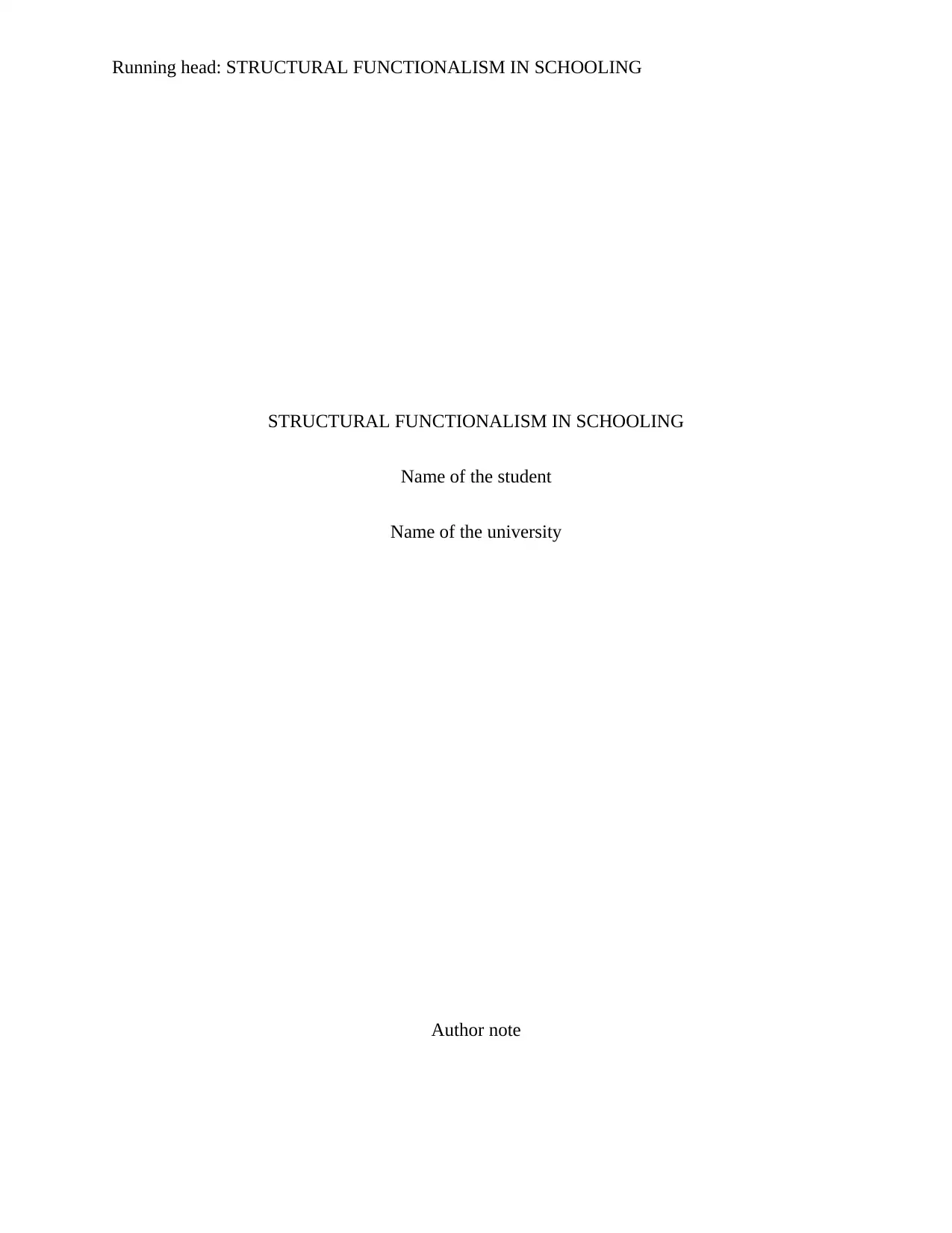
Running head: STRUCTURAL FUNCTIONALISM IN SCHOOLING
STRUCTURAL FUNCTIONALISM IN SCHOOLING
Name of the student
Name of the university
Author note
STRUCTURAL FUNCTIONALISM IN SCHOOLING
Name of the student
Name of the university
Author note
Paraphrase This Document
Need a fresh take? Get an instant paraphrase of this document with our AI Paraphraser
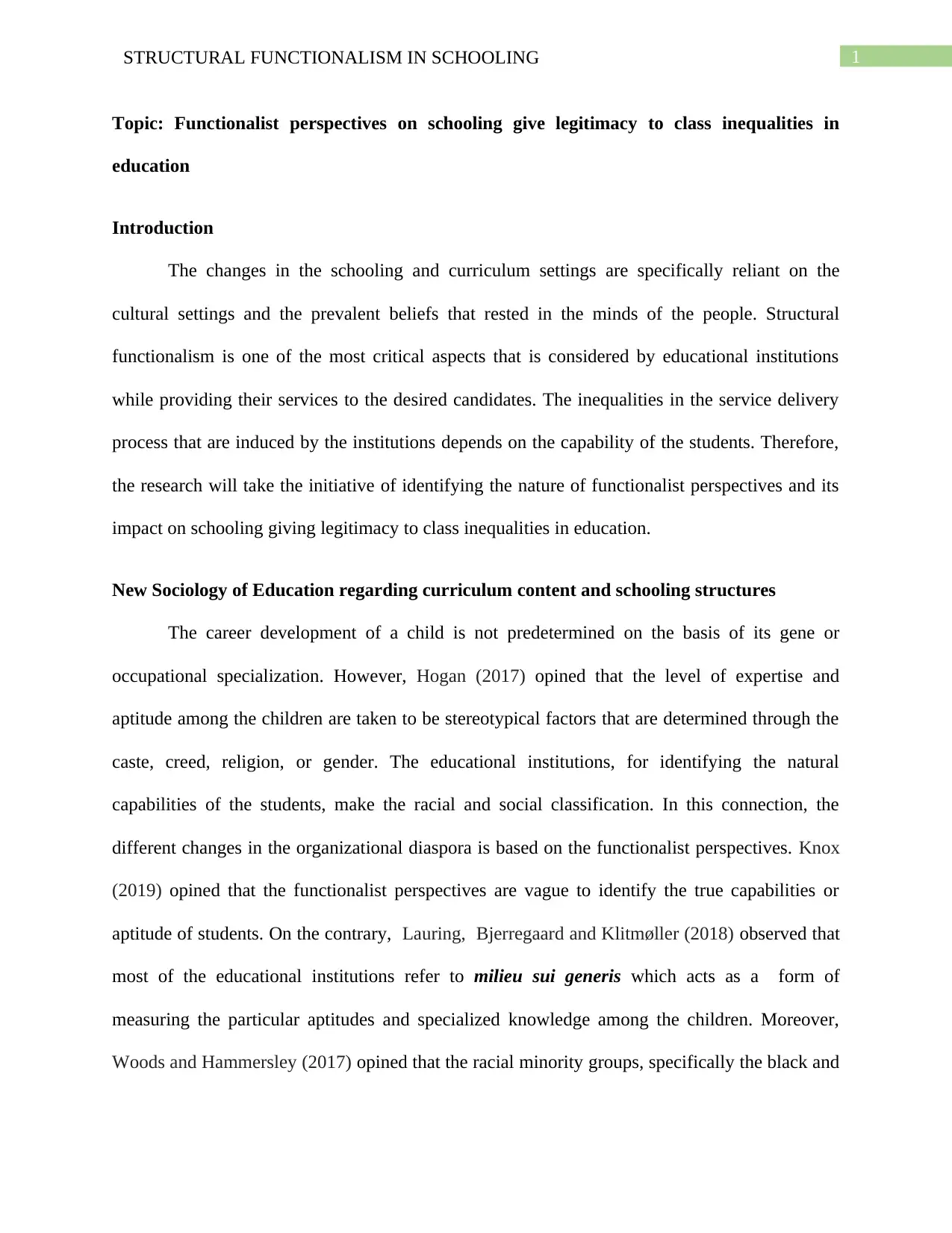
1STRUCTURAL FUNCTIONALISM IN SCHOOLING
Topic: Functionalist perspectives on schooling give legitimacy to class inequalities in
education
Introduction
The changes in the schooling and curriculum settings are specifically reliant on the
cultural settings and the prevalent beliefs that rested in the minds of the people. Structural
functionalism is one of the most critical aspects that is considered by educational institutions
while providing their services to the desired candidates. The inequalities in the service delivery
process that are induced by the institutions depends on the capability of the students. Therefore,
the research will take the initiative of identifying the nature of functionalist perspectives and its
impact on schooling giving legitimacy to class inequalities in education.
New Sociology of Education regarding curriculum content and schooling structures
The career development of a child is not predetermined on the basis of its gene or
occupational specialization. However, Hogan (2017) opined that the level of expertise and
aptitude among the children are taken to be stereotypical factors that are determined through the
caste, creed, religion, or gender. The educational institutions, for identifying the natural
capabilities of the students, make the racial and social classification. In this connection, the
different changes in the organizational diaspora is based on the functionalist perspectives. Knox
(2019) opined that the functionalist perspectives are vague to identify the true capabilities or
aptitude of students. On the contrary, Lauring, Bjerregaard and Klitmøller (2018) observed that
most of the educational institutions refer to milieu sui generis which acts as a form of
measuring the particular aptitudes and specialized knowledge among the children. Moreover,
Woods and Hammersley (2017) opined that the racial minority groups, specifically the black and
Topic: Functionalist perspectives on schooling give legitimacy to class inequalities in
education
Introduction
The changes in the schooling and curriculum settings are specifically reliant on the
cultural settings and the prevalent beliefs that rested in the minds of the people. Structural
functionalism is one of the most critical aspects that is considered by educational institutions
while providing their services to the desired candidates. The inequalities in the service delivery
process that are induced by the institutions depends on the capability of the students. Therefore,
the research will take the initiative of identifying the nature of functionalist perspectives and its
impact on schooling giving legitimacy to class inequalities in education.
New Sociology of Education regarding curriculum content and schooling structures
The career development of a child is not predetermined on the basis of its gene or
occupational specialization. However, Hogan (2017) opined that the level of expertise and
aptitude among the children are taken to be stereotypical factors that are determined through the
caste, creed, religion, or gender. The educational institutions, for identifying the natural
capabilities of the students, make the racial and social classification. In this connection, the
different changes in the organizational diaspora is based on the functionalist perspectives. Knox
(2019) opined that the functionalist perspectives are vague to identify the true capabilities or
aptitude of students. On the contrary, Lauring, Bjerregaard and Klitmøller (2018) observed that
most of the educational institutions refer to milieu sui generis which acts as a form of
measuring the particular aptitudes and specialized knowledge among the children. Moreover,
Woods and Hammersley (2017) opined that the racial minority groups, specifically the black and
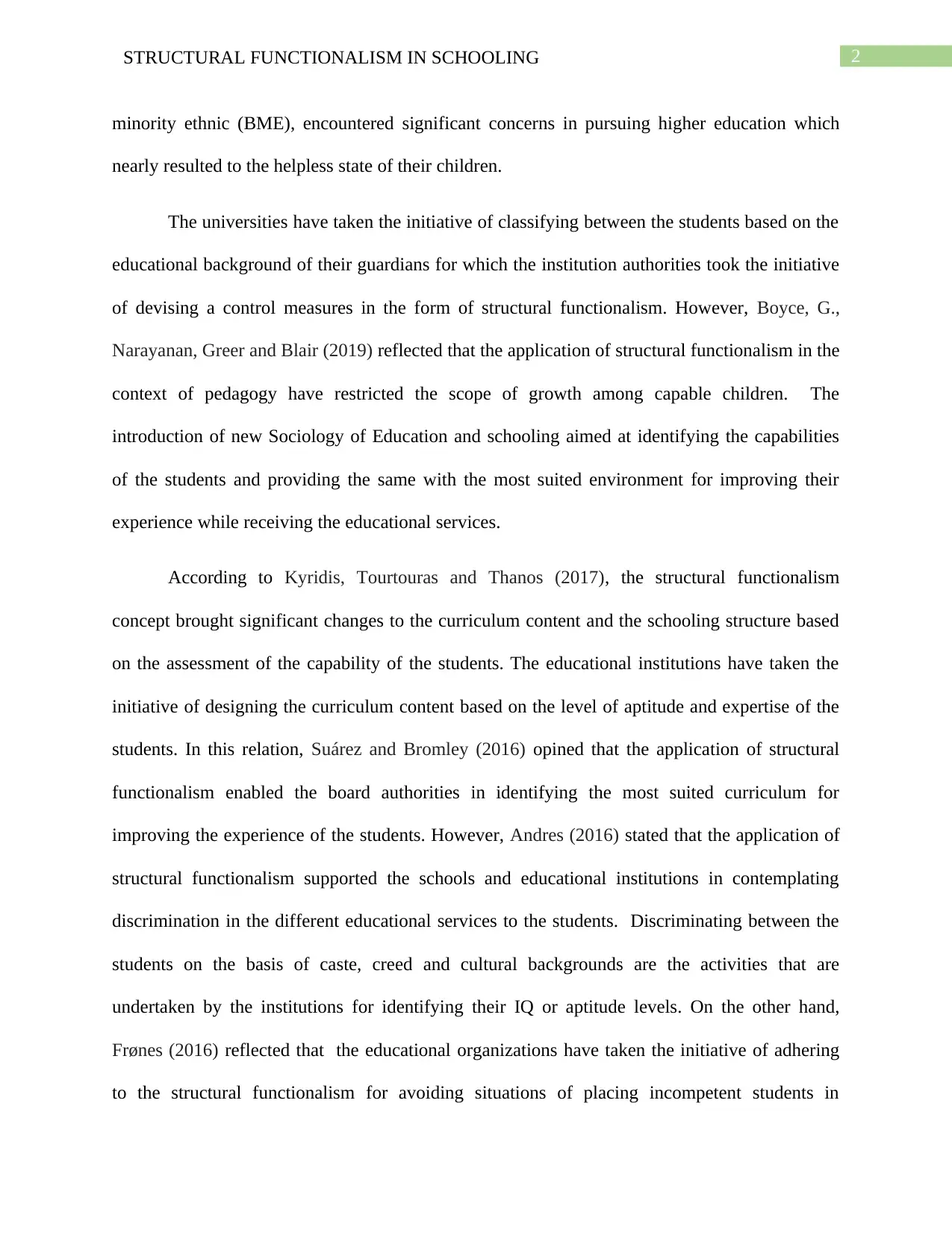
2STRUCTURAL FUNCTIONALISM IN SCHOOLING
minority ethnic (BME), encountered significant concerns in pursuing higher education which
nearly resulted to the helpless state of their children.
The universities have taken the initiative of classifying between the students based on the
educational background of their guardians for which the institution authorities took the initiative
of devising a control measures in the form of structural functionalism. However, Boyce, G.,
Narayanan, Greer and Blair (2019) reflected that the application of structural functionalism in the
context of pedagogy have restricted the scope of growth among capable children. The
introduction of new Sociology of Education and schooling aimed at identifying the capabilities
of the students and providing the same with the most suited environment for improving their
experience while receiving the educational services.
According to Kyridis, Tourtouras and Thanos (2017), the structural functionalism
concept brought significant changes to the curriculum content and the schooling structure based
on the assessment of the capability of the students. The educational institutions have taken the
initiative of designing the curriculum content based on the level of aptitude and expertise of the
students. In this relation, Suárez and Bromley (2016) opined that the application of structural
functionalism enabled the board authorities in identifying the most suited curriculum for
improving the experience of the students. However, Andres (2016) stated that the application of
structural functionalism supported the schools and educational institutions in contemplating
discrimination in the different educational services to the students. Discriminating between the
students on the basis of caste, creed and cultural backgrounds are the activities that are
undertaken by the institutions for identifying their IQ or aptitude levels. On the other hand,
Frønes (2016) reflected that the educational organizations have taken the initiative of adhering
to the structural functionalism for avoiding situations of placing incompetent students in
minority ethnic (BME), encountered significant concerns in pursuing higher education which
nearly resulted to the helpless state of their children.
The universities have taken the initiative of classifying between the students based on the
educational background of their guardians for which the institution authorities took the initiative
of devising a control measures in the form of structural functionalism. However, Boyce, G.,
Narayanan, Greer and Blair (2019) reflected that the application of structural functionalism in the
context of pedagogy have restricted the scope of growth among capable children. The
introduction of new Sociology of Education and schooling aimed at identifying the capabilities
of the students and providing the same with the most suited environment for improving their
experience while receiving the educational services.
According to Kyridis, Tourtouras and Thanos (2017), the structural functionalism
concept brought significant changes to the curriculum content and the schooling structure based
on the assessment of the capability of the students. The educational institutions have taken the
initiative of designing the curriculum content based on the level of aptitude and expertise of the
students. In this relation, Suárez and Bromley (2016) opined that the application of structural
functionalism enabled the board authorities in identifying the most suited curriculum for
improving the experience of the students. However, Andres (2016) stated that the application of
structural functionalism supported the schools and educational institutions in contemplating
discrimination in the different educational services to the students. Discriminating between the
students on the basis of caste, creed and cultural backgrounds are the activities that are
undertaken by the institutions for identifying their IQ or aptitude levels. On the other hand,
Frønes (2016) reflected that the educational organizations have taken the initiative of adhering
to the structural functionalism for avoiding situations of placing incompetent students in
⊘ This is a preview!⊘
Do you want full access?
Subscribe today to unlock all pages.

Trusted by 1+ million students worldwide
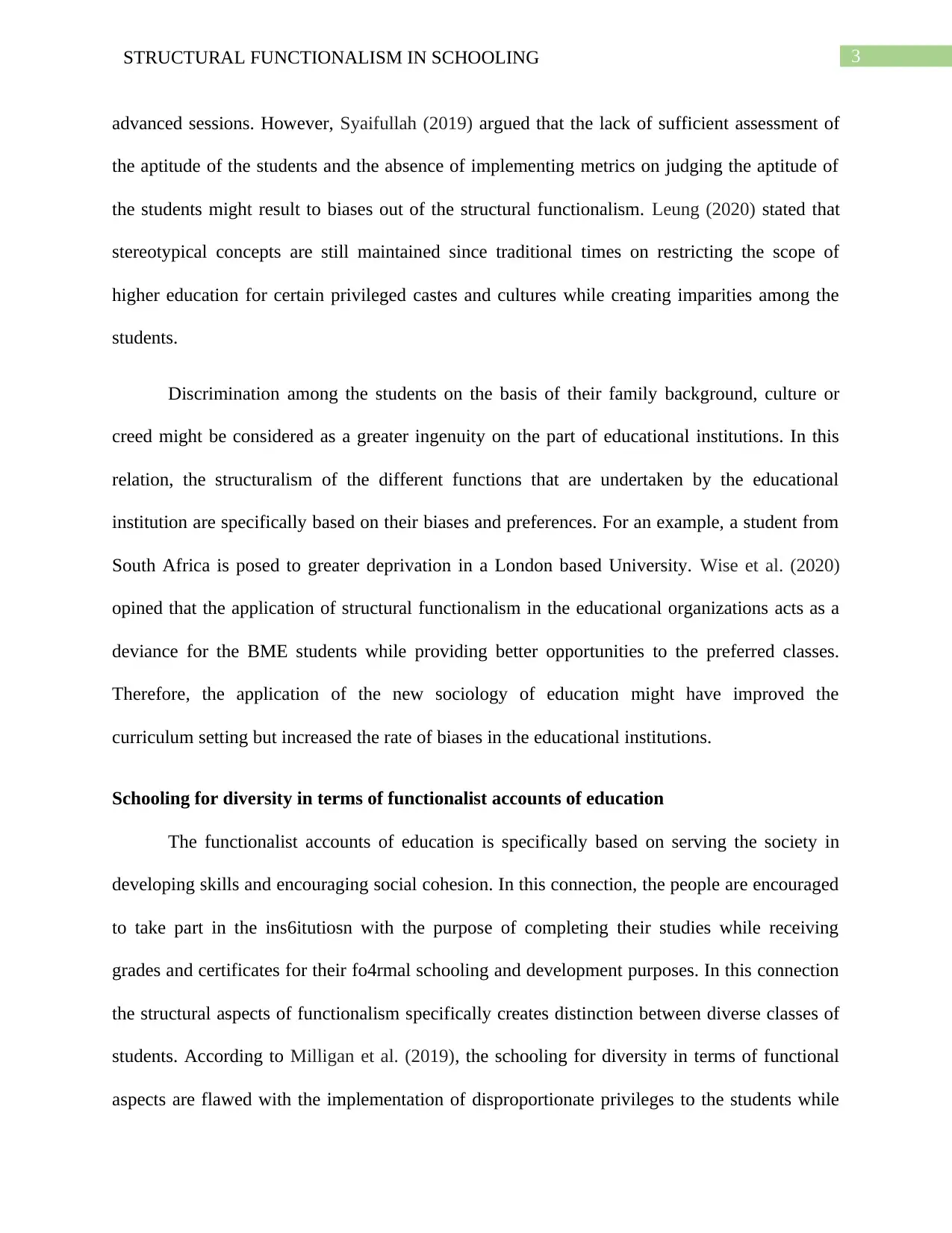
3STRUCTURAL FUNCTIONALISM IN SCHOOLING
advanced sessions. However, Syaifullah (2019) argued that the lack of sufficient assessment of
the aptitude of the students and the absence of implementing metrics on judging the aptitude of
the students might result to biases out of the structural functionalism. Leung (2020) stated that
stereotypical concepts are still maintained since traditional times on restricting the scope of
higher education for certain privileged castes and cultures while creating imparities among the
students.
Discrimination among the students on the basis of their family background, culture or
creed might be considered as a greater ingenuity on the part of educational institutions. In this
relation, the structuralism of the different functions that are undertaken by the educational
institution are specifically based on their biases and preferences. For an example, a student from
South Africa is posed to greater deprivation in a London based University. Wise et al. (2020)
opined that the application of structural functionalism in the educational organizations acts as a
deviance for the BME students while providing better opportunities to the preferred classes.
Therefore, the application of the new sociology of education might have improved the
curriculum setting but increased the rate of biases in the educational institutions.
Schooling for diversity in terms of functionalist accounts of education
The functionalist accounts of education is specifically based on serving the society in
developing skills and encouraging social cohesion. In this connection, the people are encouraged
to take part in the ins6itutiosn with the purpose of completing their studies while receiving
grades and certificates for their fo4rmal schooling and development purposes. In this connection
the structural aspects of functionalism specifically creates distinction between diverse classes of
students. According to Milligan et al. (2019), the schooling for diversity in terms of functional
aspects are flawed with the implementation of disproportionate privileges to the students while
advanced sessions. However, Syaifullah (2019) argued that the lack of sufficient assessment of
the aptitude of the students and the absence of implementing metrics on judging the aptitude of
the students might result to biases out of the structural functionalism. Leung (2020) stated that
stereotypical concepts are still maintained since traditional times on restricting the scope of
higher education for certain privileged castes and cultures while creating imparities among the
students.
Discrimination among the students on the basis of their family background, culture or
creed might be considered as a greater ingenuity on the part of educational institutions. In this
relation, the structuralism of the different functions that are undertaken by the educational
institution are specifically based on their biases and preferences. For an example, a student from
South Africa is posed to greater deprivation in a London based University. Wise et al. (2020)
opined that the application of structural functionalism in the educational organizations acts as a
deviance for the BME students while providing better opportunities to the preferred classes.
Therefore, the application of the new sociology of education might have improved the
curriculum setting but increased the rate of biases in the educational institutions.
Schooling for diversity in terms of functionalist accounts of education
The functionalist accounts of education is specifically based on serving the society in
developing skills and encouraging social cohesion. In this connection, the people are encouraged
to take part in the ins6itutiosn with the purpose of completing their studies while receiving
grades and certificates for their fo4rmal schooling and development purposes. In this connection
the structural aspects of functionalism specifically creates distinction between diverse classes of
students. According to Milligan et al. (2019), the schooling for diversity in terms of functional
aspects are flawed with the implementation of disproportionate privileges to the students while
Paraphrase This Document
Need a fresh take? Get an instant paraphrase of this document with our AI Paraphraser
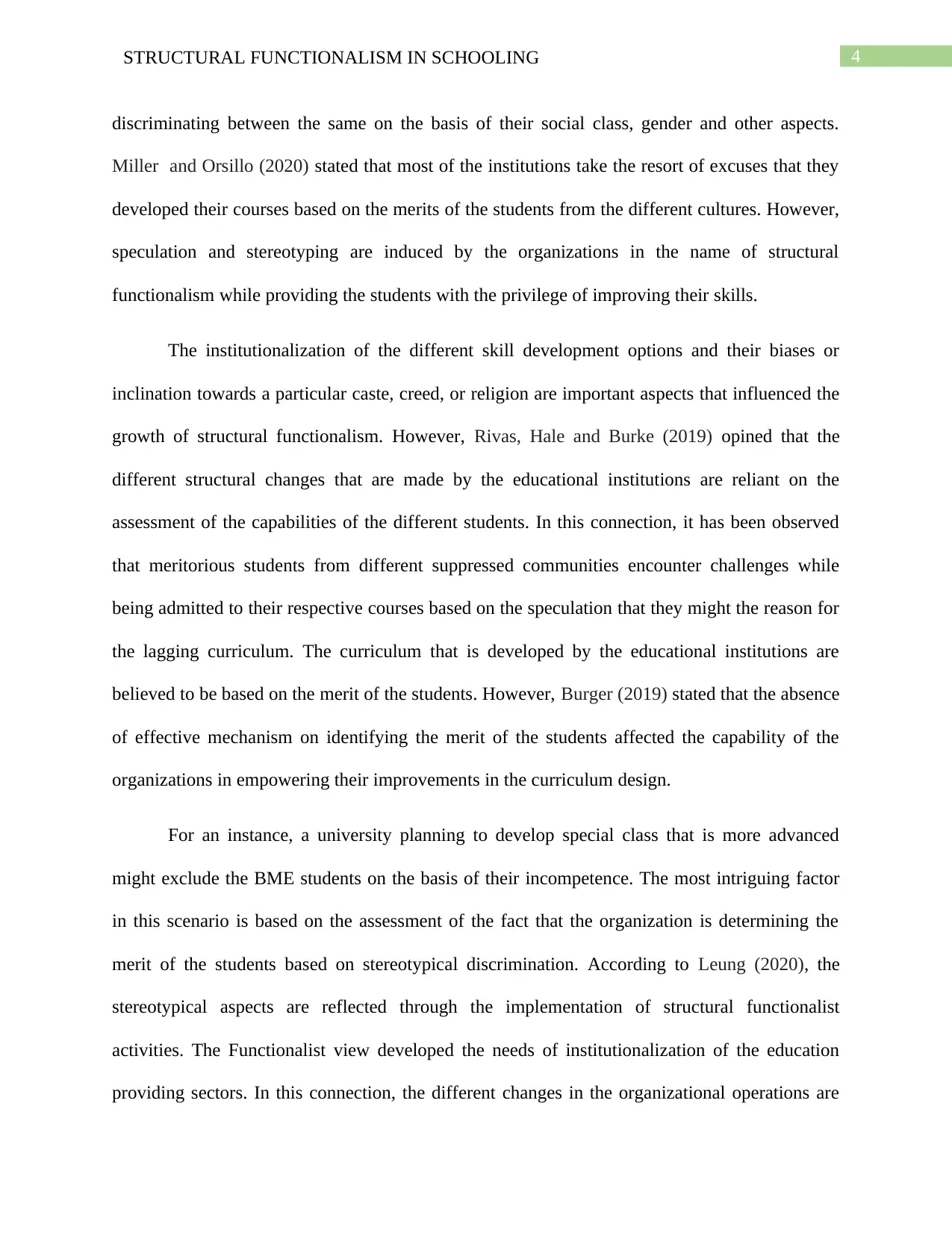
4STRUCTURAL FUNCTIONALISM IN SCHOOLING
discriminating between the same on the basis of their social class, gender and other aspects.
Miller and Orsillo (2020) stated that most of the institutions take the resort of excuses that they
developed their courses based on the merits of the students from the different cultures. However,
speculation and stereotyping are induced by the organizations in the name of structural
functionalism while providing the students with the privilege of improving their skills.
The institutionalization of the different skill development options and their biases or
inclination towards a particular caste, creed, or religion are important aspects that influenced the
growth of structural functionalism. However, Rivas, Hale and Burke (2019) opined that the
different structural changes that are made by the educational institutions are reliant on the
assessment of the capabilities of the different students. In this connection, it has been observed
that meritorious students from different suppressed communities encounter challenges while
being admitted to their respective courses based on the speculation that they might the reason for
the lagging curriculum. The curriculum that is developed by the educational institutions are
believed to be based on the merit of the students. However, Burger (2019) stated that the absence
of effective mechanism on identifying the merit of the students affected the capability of the
organizations in empowering their improvements in the curriculum design.
For an instance, a university planning to develop special class that is more advanced
might exclude the BME students on the basis of their incompetence. The most intriguing factor
in this scenario is based on the assessment of the fact that the organization is determining the
merit of the students based on stereotypical discrimination. According to Leung (2020), the
stereotypical aspects are reflected through the implementation of structural functionalist
activities. The Functionalist view developed the needs of institutionalization of the education
providing sectors. In this connection, the different changes in the organizational operations are
discriminating between the same on the basis of their social class, gender and other aspects.
Miller and Orsillo (2020) stated that most of the institutions take the resort of excuses that they
developed their courses based on the merits of the students from the different cultures. However,
speculation and stereotyping are induced by the organizations in the name of structural
functionalism while providing the students with the privilege of improving their skills.
The institutionalization of the different skill development options and their biases or
inclination towards a particular caste, creed, or religion are important aspects that influenced the
growth of structural functionalism. However, Rivas, Hale and Burke (2019) opined that the
different structural changes that are made by the educational institutions are reliant on the
assessment of the capabilities of the different students. In this connection, it has been observed
that meritorious students from different suppressed communities encounter challenges while
being admitted to their respective courses based on the speculation that they might the reason for
the lagging curriculum. The curriculum that is developed by the educational institutions are
believed to be based on the merit of the students. However, Burger (2019) stated that the absence
of effective mechanism on identifying the merit of the students affected the capability of the
organizations in empowering their improvements in the curriculum design.
For an instance, a university planning to develop special class that is more advanced
might exclude the BME students on the basis of their incompetence. The most intriguing factor
in this scenario is based on the assessment of the fact that the organization is determining the
merit of the students based on stereotypical discrimination. According to Leung (2020), the
stereotypical aspects are reflected through the implementation of structural functionalist
activities. The Functionalist view developed the needs of institutionalization of the education
providing sectors. In this connection, the different changes in the organizational operations are
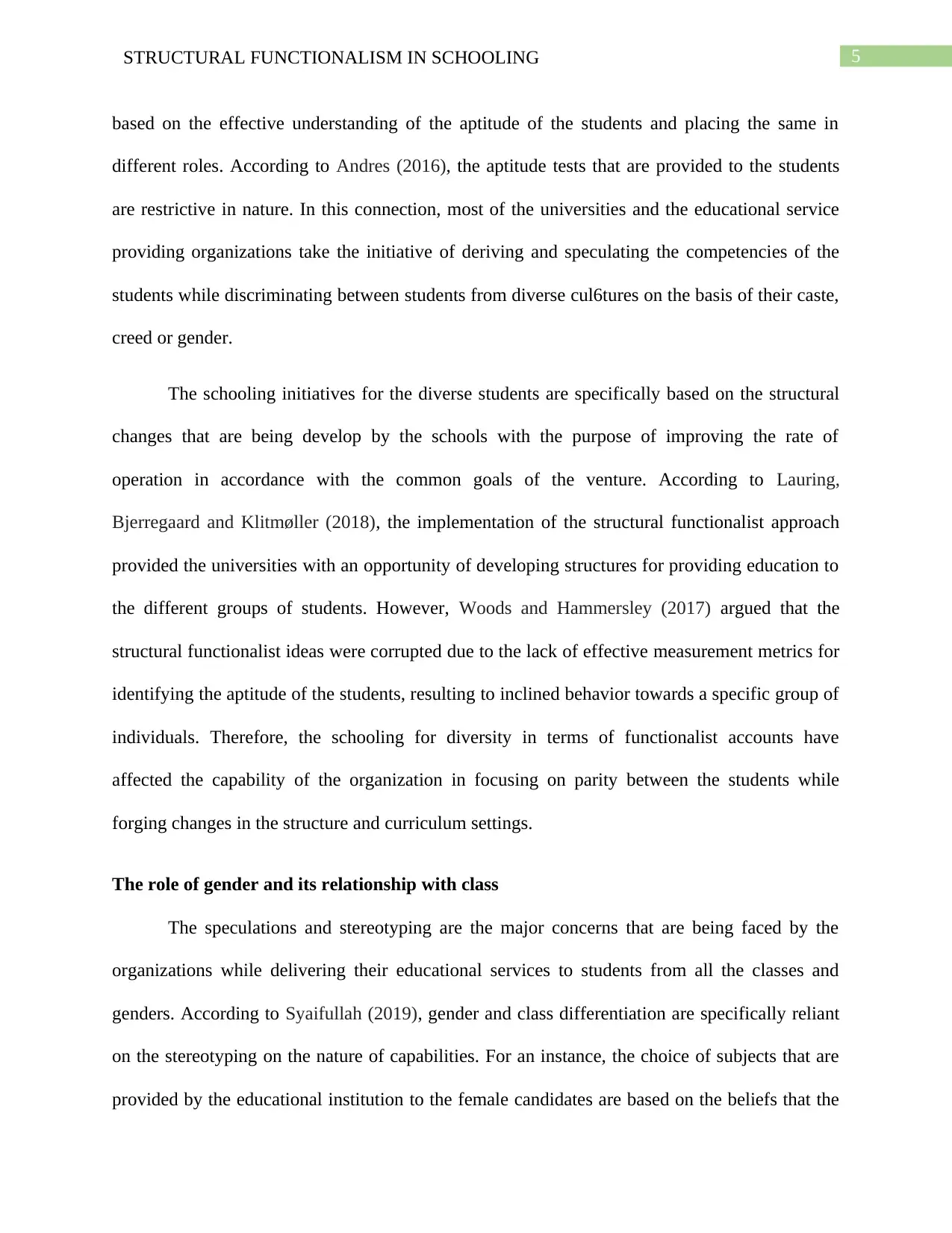
5STRUCTURAL FUNCTIONALISM IN SCHOOLING
based on the effective understanding of the aptitude of the students and placing the same in
different roles. According to Andres (2016), the aptitude tests that are provided to the students
are restrictive in nature. In this connection, most of the universities and the educational service
providing organizations take the initiative of deriving and speculating the competencies of the
students while discriminating between students from diverse cul6tures on the basis of their caste,
creed or gender.
The schooling initiatives for the diverse students are specifically based on the structural
changes that are being develop by the schools with the purpose of improving the rate of
operation in accordance with the common goals of the venture. According to Lauring,
Bjerregaard and Klitmøller (2018), the implementation of the structural functionalist approach
provided the universities with an opportunity of developing structures for providing education to
the different groups of students. However, Woods and Hammersley (2017) argued that the
structural functionalist ideas were corrupted due to the lack of effective measurement metrics for
identifying the aptitude of the students, resulting to inclined behavior towards a specific group of
individuals. Therefore, the schooling for diversity in terms of functionalist accounts have
affected the capability of the organization in focusing on parity between the students while
forging changes in the structure and curriculum settings.
The role of gender and its relationship with class
The speculations and stereotyping are the major concerns that are being faced by the
organizations while delivering their educational services to students from all the classes and
genders. According to Syaifullah (2019), gender and class differentiation are specifically reliant
on the stereotyping on the nature of capabilities. For an instance, the choice of subjects that are
provided by the educational institution to the female candidates are based on the beliefs that the
based on the effective understanding of the aptitude of the students and placing the same in
different roles. According to Andres (2016), the aptitude tests that are provided to the students
are restrictive in nature. In this connection, most of the universities and the educational service
providing organizations take the initiative of deriving and speculating the competencies of the
students while discriminating between students from diverse cul6tures on the basis of their caste,
creed or gender.
The schooling initiatives for the diverse students are specifically based on the structural
changes that are being develop by the schools with the purpose of improving the rate of
operation in accordance with the common goals of the venture. According to Lauring,
Bjerregaard and Klitmøller (2018), the implementation of the structural functionalist approach
provided the universities with an opportunity of developing structures for providing education to
the different groups of students. However, Woods and Hammersley (2017) argued that the
structural functionalist ideas were corrupted due to the lack of effective measurement metrics for
identifying the aptitude of the students, resulting to inclined behavior towards a specific group of
individuals. Therefore, the schooling for diversity in terms of functionalist accounts have
affected the capability of the organization in focusing on parity between the students while
forging changes in the structure and curriculum settings.
The role of gender and its relationship with class
The speculations and stereotyping are the major concerns that are being faced by the
organizations while delivering their educational services to students from all the classes and
genders. According to Syaifullah (2019), gender and class differentiation are specifically reliant
on the stereotyping on the nature of capabilities. For an instance, the choice of subjects that are
provided by the educational institution to the female candidates are based on the beliefs that the
⊘ This is a preview!⊘
Do you want full access?
Subscribe today to unlock all pages.

Trusted by 1+ million students worldwide
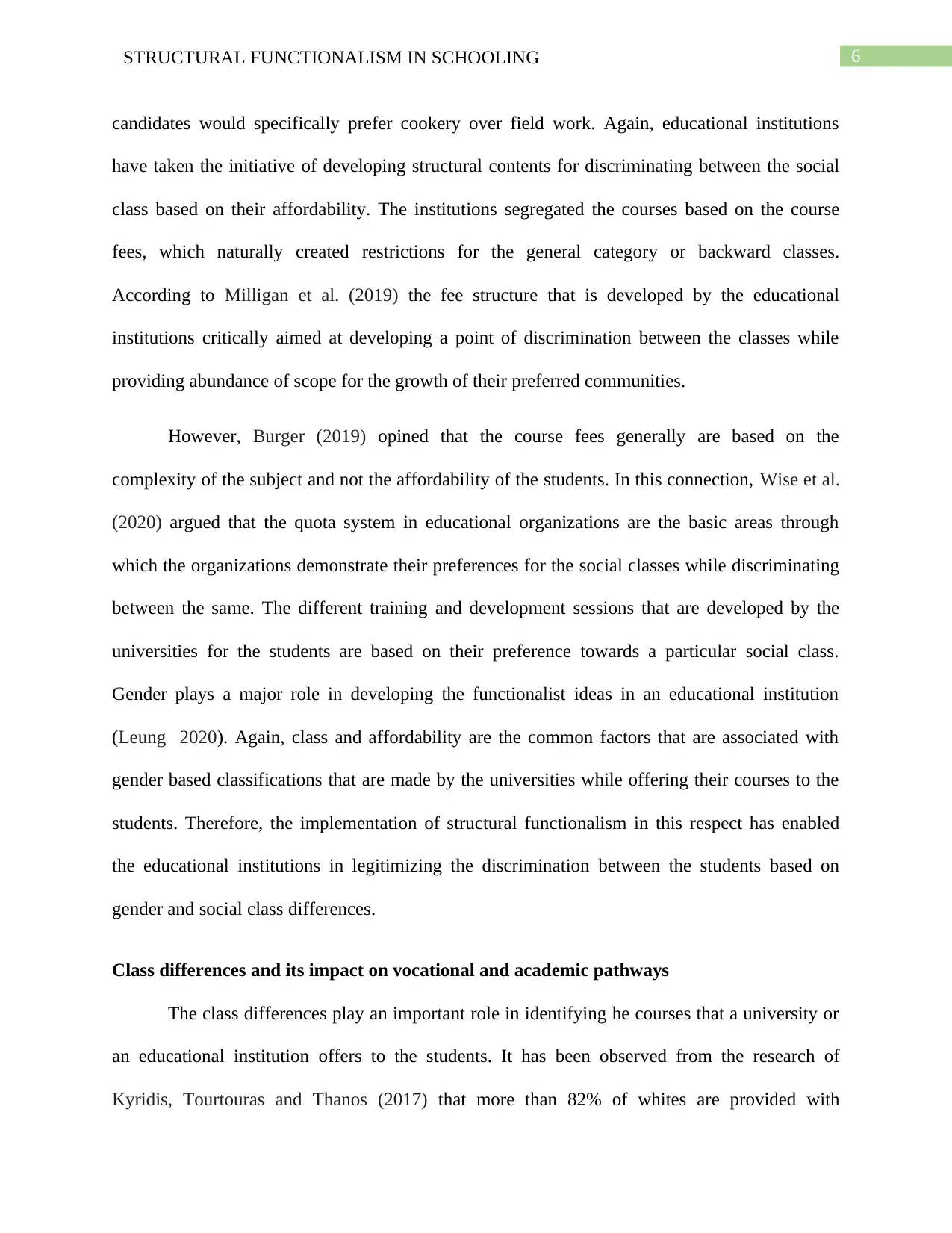
6STRUCTURAL FUNCTIONALISM IN SCHOOLING
candidates would specifically prefer cookery over field work. Again, educational institutions
have taken the initiative of developing structural contents for discriminating between the social
class based on their affordability. The institutions segregated the courses based on the course
fees, which naturally created restrictions for the general category or backward classes.
According to Milligan et al. (2019) the fee structure that is developed by the educational
institutions critically aimed at developing a point of discrimination between the classes while
providing abundance of scope for the growth of their preferred communities.
However, Burger (2019) opined that the course fees generally are based on the
complexity of the subject and not the affordability of the students. In this connection, Wise et al.
(2020) argued that the quota system in educational organizations are the basic areas through
which the organizations demonstrate their preferences for the social classes while discriminating
between the same. The different training and development sessions that are developed by the
universities for the students are based on their preference towards a particular social class.
Gender plays a major role in developing the functionalist ideas in an educational institution
(Leung 2020). Again, class and affordability are the common factors that are associated with
gender based classifications that are made by the universities while offering their courses to the
students. Therefore, the implementation of structural functionalism in this respect has enabled
the educational institutions in legitimizing the discrimination between the students based on
gender and social class differences.
Class differences and its impact on vocational and academic pathways
The class differences play an important role in identifying he courses that a university or
an educational institution offers to the students. It has been observed from the research of
Kyridis, Tourtouras and Thanos (2017) that more than 82% of whites are provided with
candidates would specifically prefer cookery over field work. Again, educational institutions
have taken the initiative of developing structural contents for discriminating between the social
class based on their affordability. The institutions segregated the courses based on the course
fees, which naturally created restrictions for the general category or backward classes.
According to Milligan et al. (2019) the fee structure that is developed by the educational
institutions critically aimed at developing a point of discrimination between the classes while
providing abundance of scope for the growth of their preferred communities.
However, Burger (2019) opined that the course fees generally are based on the
complexity of the subject and not the affordability of the students. In this connection, Wise et al.
(2020) argued that the quota system in educational organizations are the basic areas through
which the organizations demonstrate their preferences for the social classes while discriminating
between the same. The different training and development sessions that are developed by the
universities for the students are based on their preference towards a particular social class.
Gender plays a major role in developing the functionalist ideas in an educational institution
(Leung 2020). Again, class and affordability are the common factors that are associated with
gender based classifications that are made by the universities while offering their courses to the
students. Therefore, the implementation of structural functionalism in this respect has enabled
the educational institutions in legitimizing the discrimination between the students based on
gender and social class differences.
Class differences and its impact on vocational and academic pathways
The class differences play an important role in identifying he courses that a university or
an educational institution offers to the students. It has been observed from the research of
Kyridis, Tourtouras and Thanos (2017) that more than 82% of whites are provided with
Paraphrase This Document
Need a fresh take? Get an instant paraphrase of this document with our AI Paraphraser
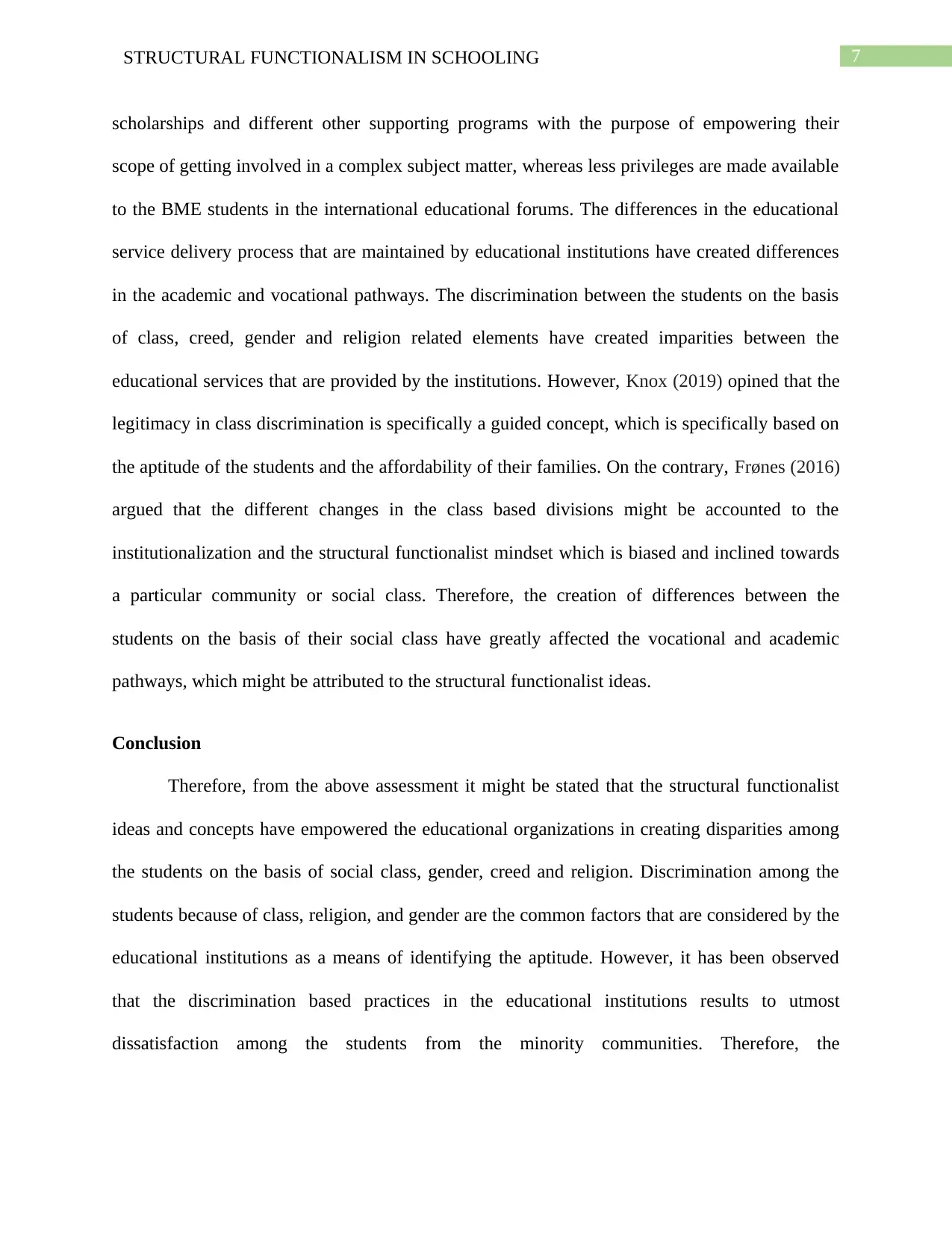
7STRUCTURAL FUNCTIONALISM IN SCHOOLING
scholarships and different other supporting programs with the purpose of empowering their
scope of getting involved in a complex subject matter, whereas less privileges are made available
to the BME students in the international educational forums. The differences in the educational
service delivery process that are maintained by educational institutions have created differences
in the academic and vocational pathways. The discrimination between the students on the basis
of class, creed, gender and religion related elements have created imparities between the
educational services that are provided by the institutions. However, Knox (2019) opined that the
legitimacy in class discrimination is specifically a guided concept, which is specifically based on
the aptitude of the students and the affordability of their families. On the contrary, Frønes (2016)
argued that the different changes in the class based divisions might be accounted to the
institutionalization and the structural functionalist mindset which is biased and inclined towards
a particular community or social class. Therefore, the creation of differences between the
students on the basis of their social class have greatly affected the vocational and academic
pathways, which might be attributed to the structural functionalist ideas.
Conclusion
Therefore, from the above assessment it might be stated that the structural functionalist
ideas and concepts have empowered the educational organizations in creating disparities among
the students on the basis of social class, gender, creed and religion. Discrimination among the
students because of class, religion, and gender are the common factors that are considered by the
educational institutions as a means of identifying the aptitude. However, it has been observed
that the discrimination based practices in the educational institutions results to utmost
dissatisfaction among the students from the minority communities. Therefore, the
scholarships and different other supporting programs with the purpose of empowering their
scope of getting involved in a complex subject matter, whereas less privileges are made available
to the BME students in the international educational forums. The differences in the educational
service delivery process that are maintained by educational institutions have created differences
in the academic and vocational pathways. The discrimination between the students on the basis
of class, creed, gender and religion related elements have created imparities between the
educational services that are provided by the institutions. However, Knox (2019) opined that the
legitimacy in class discrimination is specifically a guided concept, which is specifically based on
the aptitude of the students and the affordability of their families. On the contrary, Frønes (2016)
argued that the different changes in the class based divisions might be accounted to the
institutionalization and the structural functionalist mindset which is biased and inclined towards
a particular community or social class. Therefore, the creation of differences between the
students on the basis of their social class have greatly affected the vocational and academic
pathways, which might be attributed to the structural functionalist ideas.
Conclusion
Therefore, from the above assessment it might be stated that the structural functionalist
ideas and concepts have empowered the educational organizations in creating disparities among
the students on the basis of social class, gender, creed and religion. Discrimination among the
students because of class, religion, and gender are the common factors that are considered by the
educational institutions as a means of identifying the aptitude. However, it has been observed
that the discrimination based practices in the educational institutions results to utmost
dissatisfaction among the students from the minority communities. Therefore, the
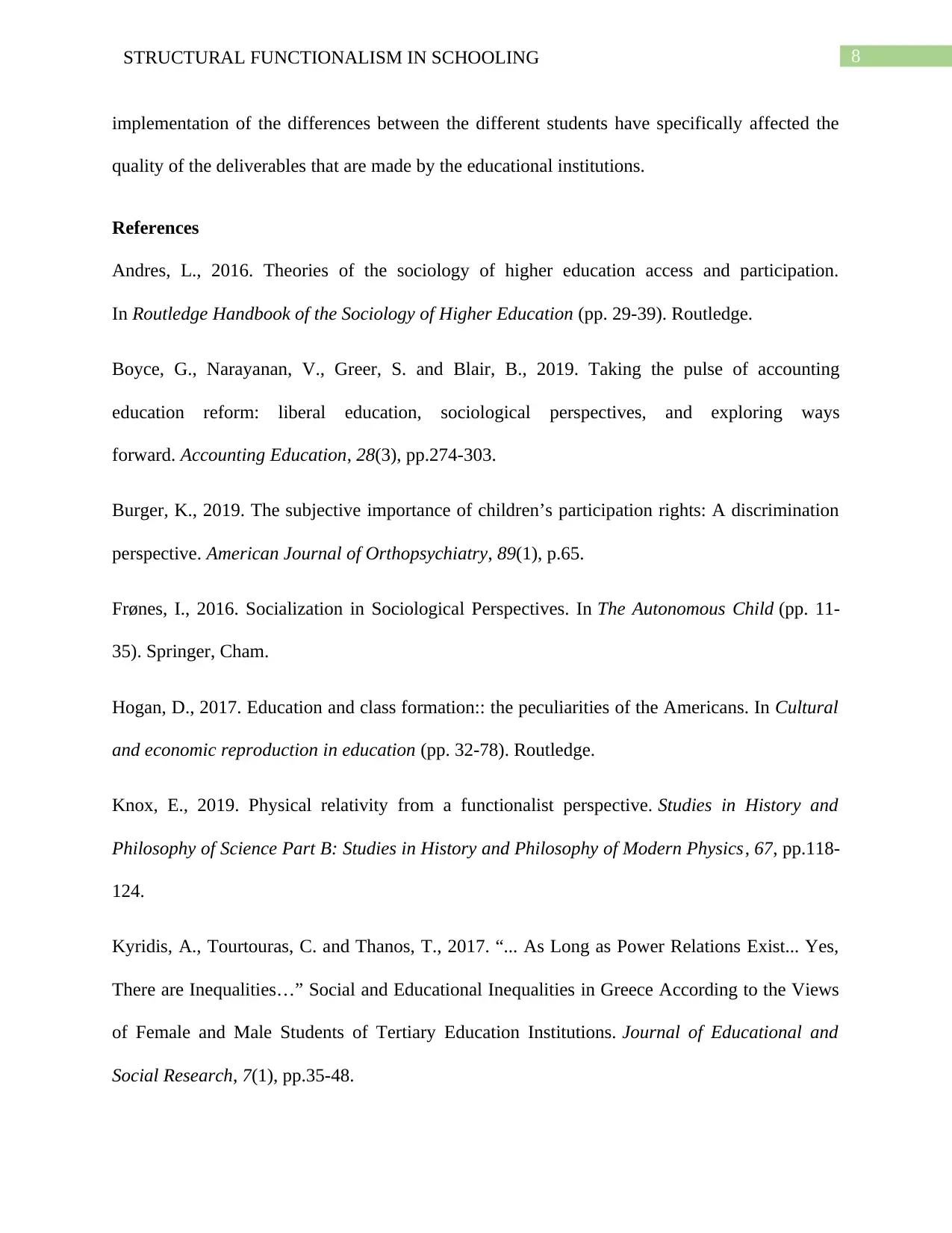
8STRUCTURAL FUNCTIONALISM IN SCHOOLING
implementation of the differences between the different students have specifically affected the
quality of the deliverables that are made by the educational institutions.
References
Andres, L., 2016. Theories of the sociology of higher education access and participation.
In Routledge Handbook of the Sociology of Higher Education (pp. 29-39). Routledge.
Boyce, G., Narayanan, V., Greer, S. and Blair, B., 2019. Taking the pulse of accounting
education reform: liberal education, sociological perspectives, and exploring ways
forward. Accounting Education, 28(3), pp.274-303.
Burger, K., 2019. The subjective importance of children’s participation rights: A discrimination
perspective. American Journal of Orthopsychiatry, 89(1), p.65.
Frønes, I., 2016. Socialization in Sociological Perspectives. In The Autonomous Child (pp. 11-
35). Springer, Cham.
Hogan, D., 2017. Education and class formation:: the peculiarities of the Americans. In Cultural
and economic reproduction in education (pp. 32-78). Routledge.
Knox, E., 2019. Physical relativity from a functionalist perspective. Studies in History and
Philosophy of Science Part B: Studies in History and Philosophy of Modern Physics, 67, pp.118-
124.
Kyridis, A., Tourtouras, C. and Thanos, T., 2017. “... As Long as Power Relations Exist... Yes,
There are Inequalities…” Social and Educational Inequalities in Greece According to the Views
of Female and Male Students of Tertiary Education Institutions. Journal of Educational and
Social Research, 7(1), pp.35-48.
implementation of the differences between the different students have specifically affected the
quality of the deliverables that are made by the educational institutions.
References
Andres, L., 2016. Theories of the sociology of higher education access and participation.
In Routledge Handbook of the Sociology of Higher Education (pp. 29-39). Routledge.
Boyce, G., Narayanan, V., Greer, S. and Blair, B., 2019. Taking the pulse of accounting
education reform: liberal education, sociological perspectives, and exploring ways
forward. Accounting Education, 28(3), pp.274-303.
Burger, K., 2019. The subjective importance of children’s participation rights: A discrimination
perspective. American Journal of Orthopsychiatry, 89(1), p.65.
Frønes, I., 2016. Socialization in Sociological Perspectives. In The Autonomous Child (pp. 11-
35). Springer, Cham.
Hogan, D., 2017. Education and class formation:: the peculiarities of the Americans. In Cultural
and economic reproduction in education (pp. 32-78). Routledge.
Knox, E., 2019. Physical relativity from a functionalist perspective. Studies in History and
Philosophy of Science Part B: Studies in History and Philosophy of Modern Physics, 67, pp.118-
124.
Kyridis, A., Tourtouras, C. and Thanos, T., 2017. “... As Long as Power Relations Exist... Yes,
There are Inequalities…” Social and Educational Inequalities in Greece According to the Views
of Female and Male Students of Tertiary Education Institutions. Journal of Educational and
Social Research, 7(1), pp.35-48.
⊘ This is a preview!⊘
Do you want full access?
Subscribe today to unlock all pages.

Trusted by 1+ million students worldwide
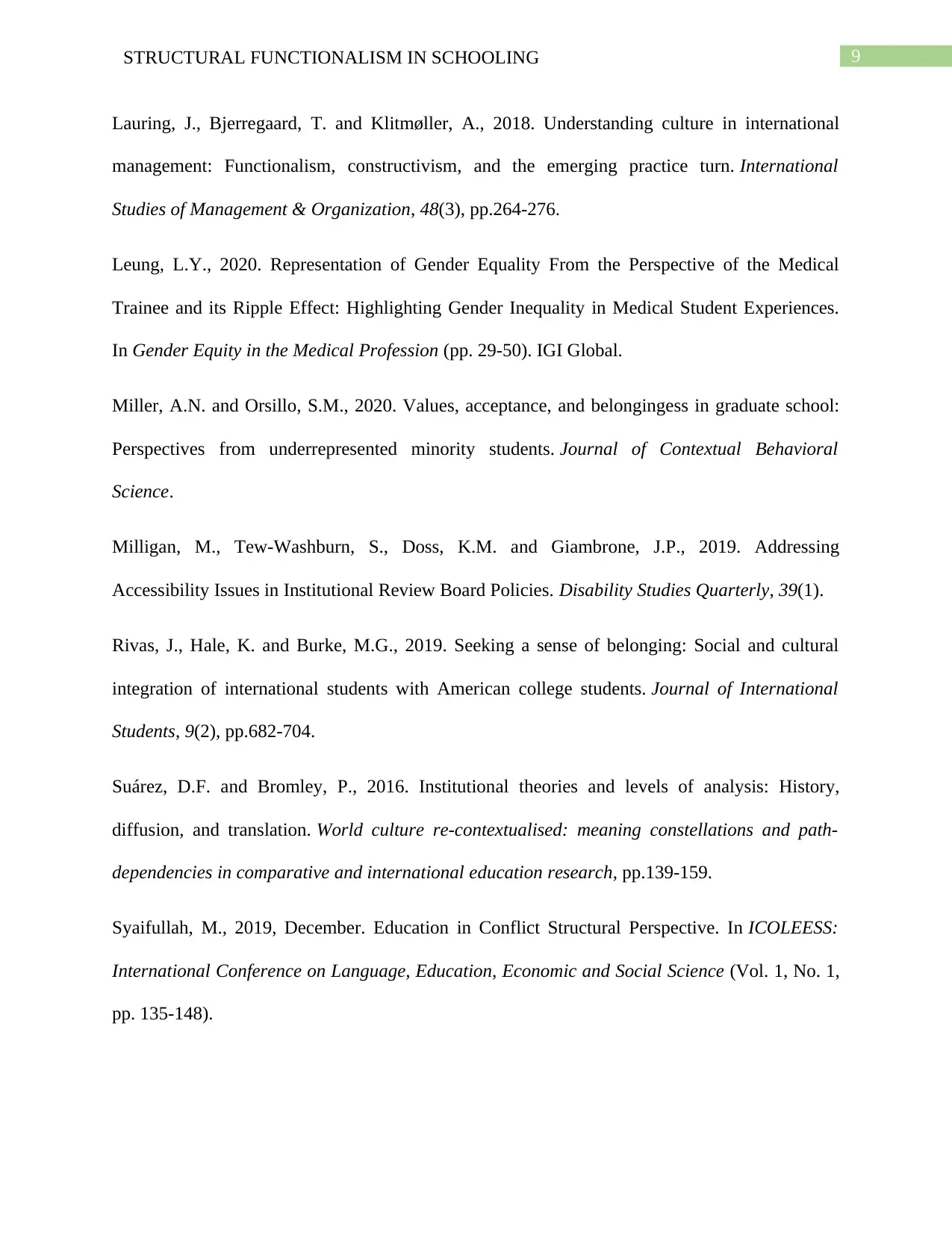
9STRUCTURAL FUNCTIONALISM IN SCHOOLING
Lauring, J., Bjerregaard, T. and Klitmøller, A., 2018. Understanding culture in international
management: Functionalism, constructivism, and the emerging practice turn. International
Studies of Management & Organization, 48(3), pp.264-276.
Leung, L.Y., 2020. Representation of Gender Equality From the Perspective of the Medical
Trainee and its Ripple Effect: Highlighting Gender Inequality in Medical Student Experiences.
In Gender Equity in the Medical Profession (pp. 29-50). IGI Global.
Miller, A.N. and Orsillo, S.M., 2020. Values, acceptance, and belongingess in graduate school:
Perspectives from underrepresented minority students. Journal of Contextual Behavioral
Science.
Milligan, M., Tew-Washburn, S., Doss, K.M. and Giambrone, J.P., 2019. Addressing
Accessibility Issues in Institutional Review Board Policies. Disability Studies Quarterly, 39(1).
Rivas, J., Hale, K. and Burke, M.G., 2019. Seeking a sense of belonging: Social and cultural
integration of international students with American college students. Journal of International
Students, 9(2), pp.682-704.
Suárez, D.F. and Bromley, P., 2016. Institutional theories and levels of analysis: History,
diffusion, and translation. World culture re-contextualised: meaning constellations and path-
dependencies in comparative and international education research, pp.139-159.
Syaifullah, M., 2019, December. Education in Conflict Structural Perspective. In ICOLEESS:
International Conference on Language, Education, Economic and Social Science (Vol. 1, No. 1,
pp. 135-148).
Lauring, J., Bjerregaard, T. and Klitmøller, A., 2018. Understanding culture in international
management: Functionalism, constructivism, and the emerging practice turn. International
Studies of Management & Organization, 48(3), pp.264-276.
Leung, L.Y., 2020. Representation of Gender Equality From the Perspective of the Medical
Trainee and its Ripple Effect: Highlighting Gender Inequality in Medical Student Experiences.
In Gender Equity in the Medical Profession (pp. 29-50). IGI Global.
Miller, A.N. and Orsillo, S.M., 2020. Values, acceptance, and belongingess in graduate school:
Perspectives from underrepresented minority students. Journal of Contextual Behavioral
Science.
Milligan, M., Tew-Washburn, S., Doss, K.M. and Giambrone, J.P., 2019. Addressing
Accessibility Issues in Institutional Review Board Policies. Disability Studies Quarterly, 39(1).
Rivas, J., Hale, K. and Burke, M.G., 2019. Seeking a sense of belonging: Social and cultural
integration of international students with American college students. Journal of International
Students, 9(2), pp.682-704.
Suárez, D.F. and Bromley, P., 2016. Institutional theories and levels of analysis: History,
diffusion, and translation. World culture re-contextualised: meaning constellations and path-
dependencies in comparative and international education research, pp.139-159.
Syaifullah, M., 2019, December. Education in Conflict Structural Perspective. In ICOLEESS:
International Conference on Language, Education, Economic and Social Science (Vol. 1, No. 1,
pp. 135-148).
Paraphrase This Document
Need a fresh take? Get an instant paraphrase of this document with our AI Paraphraser
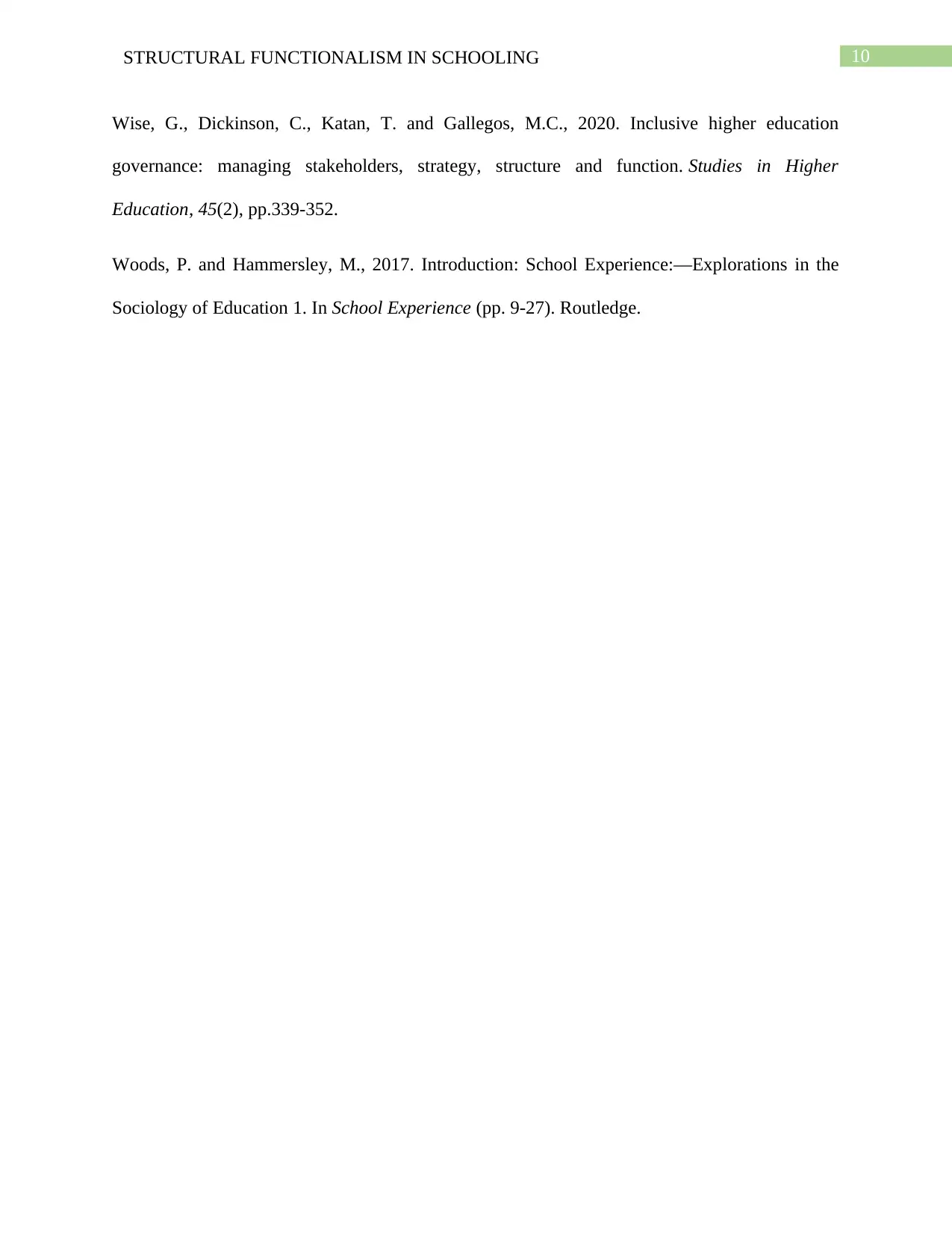
10STRUCTURAL FUNCTIONALISM IN SCHOOLING
Wise, G., Dickinson, C., Katan, T. and Gallegos, M.C., 2020. Inclusive higher education
governance: managing stakeholders, strategy, structure and function. Studies in Higher
Education, 45(2), pp.339-352.
Woods, P. and Hammersley, M., 2017. Introduction: School Experience:—Explorations in the
Sociology of Education 1. In School Experience (pp. 9-27). Routledge.
Wise, G., Dickinson, C., Katan, T. and Gallegos, M.C., 2020. Inclusive higher education
governance: managing stakeholders, strategy, structure and function. Studies in Higher
Education, 45(2), pp.339-352.
Woods, P. and Hammersley, M., 2017. Introduction: School Experience:—Explorations in the
Sociology of Education 1. In School Experience (pp. 9-27). Routledge.
1 out of 11
Related Documents
Your All-in-One AI-Powered Toolkit for Academic Success.
+13062052269
info@desklib.com
Available 24*7 on WhatsApp / Email
![[object Object]](/_next/static/media/star-bottom.7253800d.svg)
Unlock your academic potential
Copyright © 2020–2026 A2Z Services. All Rights Reserved. Developed and managed by ZUCOL.



